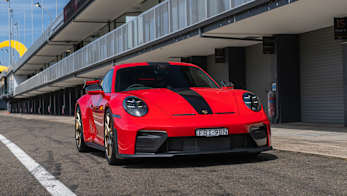Mazda has been slower to the electric vehicle (EV) game than some other big-name manufacturers in Australia, but that could all be about to change, with Toyota's help.
While Mazda is already fielding its MX-30 EV in the tailpipe emissions-free small SUV segment, the brand has only committed to 1000 units for Australia, and the driving range on offer of 200km is noticeably less than rivals that are often also more affordable.
Mazda has already announced plans, called Sustainable Zoom-Zoom 2030, to bring to market three new EVs by 2025 based on its new SkyActiv Multi-Solution Scalable Architecture, but two years since that declaration, it still remains unclear exactly what those models will be.
-
Better late than nEVer: How Mazda will accelerate its electric car plans to catch up to Tesla, Hyundai and others
-
Toyota goes BIG on EVs: 30 electric vehicles coming by 2030 in monster $100b push
-
Mazda's massive EV play revealed: 13 electrified models - including electric CX-5, CX-30 and Mazda2 - on the cards by 2025
Mazda has since revised its plans, announced in late 2022, indicating an EV sales mix of 25-40 per cent from the start of the new decade.
However, a report from Autonews details how Mazda could not only catch-up with rivals like Hyundai and Kia, but even leapfrog them thanks to the help of the biggest car brand in the world, Toyota.
Toyota has made no illusions that it wants to get into the electric car space in a big way, first with the bZ4X launching locally later this year, and showing off 16 concept EVs in late 2021 with plans to launch 30 electric models by the end of the decade.
Underpinning Toyota's grand plan is a new-generation EV platform that is expected to arrive in 2026, while plans are underway by current CEO Koji Sato to streamline existing and upcoming manufacturing processes to bring products to market much faster at a more affordable cost.
.jpg)
And this is where Mazda, and other Toyota affiliates like Subaru, Suzuki and Daihatsu, come in.
With a strategic alliance in place, and Toyota already sharing its technologies with other brands as seen with the Toyota Yaris-rebadged Mazda2 in Europe, the bZ4X-twinning Subaru Solterra and the Corolla-related Suzuki Swace, this relationship could easily extend to the next-generation of EVs.
This also plays into Toyota's ambition to sell 3.5 million EVs a year by 2020, around half of which it expects to be built on its new electric platform, as sharing its technology would boost production numbers and profits.
Keep in mind though, 3.5 million EV sales a year is still just a fraction of Toyota's overall sales, around 35 per cent in fact based on the brand's overall 2022 tally of 10,483,024 sales.
But what this does mean is that Mazda, Subaru and Suzuki could have an off-the-shelf competitor in the EV race with the latest in battery technology that could easily rival what Hyundai, Kia, Nissan, Ford, Tesla and others would be doing at the time.
Toyota has been spruiking advancements in its battery technology recently, claiming a new breakthrough in solid-state technology that should drastically alleviate fears of EV naysayers.
.jpg)
The new production technique allows for more durable batteries with less weight and cost, resulting in a unit that could power a vehicle for up to 1200km and boast a recharge time of just 10 minutes.
Now, Toyota has never actually said it would build an EV with this range, but the research will no doubt filter down to production models and means we should see Toyota-developed electric cars with more driving range.
Toyota isn't the only brand working on solid-state battery technology though, with Nissan, Mercedes-Benz, BMW, Stellantis (which includes Jeep, Fiat, Alfa Romeo, Peugeot and Citroen), Honda, Ford and more also putting in development in the EV-advancing field.
And where solid-state battery technology differs from the existing liquid-based lithium-ion products currently available in market is that research has shown they reduce charging times, need a smaller footprint to deliver the same driving range and have lower risk of catching fire.













.jpg)

.jpg)
.jpg)


.jpg)

.jpg)

.jpg)




.jpg)
.jpg)
